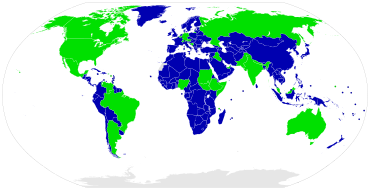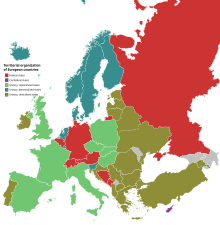Unitary state


A unitary state is a state governed as a single entity in which the central government is ultimately supreme. Unitary states stand in contrast with federations, also known as federal states.
| Part of the Politics series |
| Basic forms of government |
|---|
| List of countries by system of government |
|
|
Overview

In unitary states, the central government may create (or abolish) administrative divisions (sub-national units).[1] Such units exercise only the powers that the central government chooses to delegate. Although political power may be delegated through devolution to regional or local governments by statute, the central government may abrogate the acts of devolved governments or curtail (or expand) their powers. A large majority of the world's states (166 of the 193 UN member states) have a unitary system of government.[2]
In federations, the provincial/regional governments share powers with the central government as equal actors through a written constitution, to which the consent of both is required to make amendments. This means that the sub-national units have a right of existence and powers that cannot be unilaterally changed by the central government.[3]
Devolution within a unitary state, like federalism, may be symmetrical, with all sub-national units having the same powers and status, or asymmetric, with sub-national units varying in their powers and status. Many unitary states have no areas possessing a degree of autonomy.[4] In such countries, sub-national regions cannot decide their own laws. Examples are Romania, Ireland and Norway. Svalbard has even less autonomy than the mainland. It is directly controlled by the government and has no local rule.
List of unitary republics and unitary kingdoms
Italics: States with limited recognition from other sovereign states or intergovernmental organizations.
Unitary republics
 Afghanistan
Afghanistan Albania
Albania Algeria
Algeria Angola
Angola Armenia
Armenia Azerbaijan
Azerbaijan Bangladesh
Bangladesh Belarus
Belarus Benin
Benin Bolivia
Bolivia Botswana
Botswana Bulgaria
Bulgaria Burkina Faso
Burkina Faso Burundi
Burundi Cameroon
Cameroon Cape Verde
Cape Verde Central African Republic
Central African Republic Chad
Chad Chile
Chile People's Republic of China [5]
People's Republic of China [5] Republic of China
Republic of China Colombia
Colombia Democratic Republic of the Congo
Democratic Republic of the Congo Republic of the Congo
Republic of the Congo Costa Rica
Costa Rica Croatia
Croatia Cuba
Cuba Cyprus
Cyprus Czech Republic
Czech Republic Djibouti
Djibouti Dominica
Dominica Dominican Republic
Dominican Republic East Timor
East Timor Ecuador
Ecuador Egypt
Egypt El Salvador
El Salvador Equatorial Guinea
Equatorial Guinea Eritrea
Eritrea Estonia
Estonia Fiji
Fiji Finland
Finland France
France Gabon
Gabon Gambia
Gambia Georgia
Georgia Ghana
Ghana Greece
Greece Guatemala
Guatemala Guinea
Guinea Guinea-Bissau
Guinea-Bissau Guyana
Guyana Haiti
Haiti Honduras
Honduras Hungary
Hungary Iceland
Iceland Indonesia
Indonesia Iran
Iran Ireland
Ireland Israel
Israel Italy
Italy Ivory Coast
Ivory Coast Kazakhstan
Kazakhstan Kenya
Kenya Kiribati
Kiribati North Korea
North Korea South Korea
South Korea Kosovo
Kosovo Kyrgyzstan
Kyrgyzstan Laos
Laos Latvia
Latvia Lebanon
Lebanon Liberia
Liberia Libya
Libya Lithuania
Lithuania Madagascar
Madagascar Malawi
Malawi Maldives
Maldives Mali
Mali Malta
Malta Marshall Islands
Marshall Islands Mauritania
Mauritania Mauritius
Mauritius Moldova
Moldova Mongolia
Mongolia Montenegro
Montenegro Mozambique
Mozambique Myanmar
Myanmar Namibia
Namibia Nauru
Nauru Nicaragua
Nicaragua Niger
Niger North Macedonia
North Macedonia Palau
Palau Palestine
Palestine Panama
Panama Paraguay
Paraguay Peru
Peru Philippines
Philippines Poland
Poland Portugal
Portugal Romania
Romania Rwanda
Rwanda Samoa
Samoa San Marino
San Marino São Tomé and Príncipe
São Tomé and Príncipe Senegal
Senegal Serbia
Serbia Seychelles
Seychelles Sierra Leone
Sierra Leone Singapore
Singapore Slovakia
Slovakia Slovenia
Slovenia Somaliland
Somaliland South Africa
South Africa Sri Lanka
Sri Lanka Suriname
Suriname Syria
Syria Tajikistan
Tajikistan Tanzania
Tanzania Togo
Togo Transnistria
Transnistria Trinidad and Tobago
Trinidad and Tobago Tunisia
Tunisia Turkey
Turkey Turkmenistan
Turkmenistan Uganda
Uganda Ukraine
Ukraine Uruguay
Uruguay Uzbekistan
Uzbekistan Vanuatu
Vanuatu Vietnam
Vietnam Yemen
Yemen Zambia
Zambia Zimbabwe
Zimbabwe
Unitary monarchies
The United Kingdom of Great Britain and Northern Ireland is an example of a unitary state. Scotland, Wales and Northern Ireland have a degree of autonomous devolved power, but such power is delegated by the Parliament of the United Kingdom, which may enact laws unilaterally altering or abolishing devolution (England does not have any devolved power). Similarly in the Kingdom of Spain, the devolved powers are delegated through the central government.
 Andorra
Andorra Antigua and Barbuda
Antigua and Barbuda Bahrain
Bahrain The Bahamas
The Bahamas Barbados
Barbados Belize
Belize Bhutan
Bhutan Brunei
Brunei Cambodia
Cambodia Denmark
Denmark Eswatini
Eswatini Grenada
Grenada Gibraltar
Gibraltar Jamaica
Jamaica Japan
Japan Jordan
Jordan Kuwait
Kuwait Lesotho
Lesotho Liechtenstein
Liechtenstein Luxembourg
Luxembourg Monaco
Monaco Morocco
Morocco Netherlands
Netherlands New Zealand[6]
New Zealand[6] Norway
Norway Oman
Oman Papua New Guinea
Papua New Guinea Qatar
Qatar Saint Lucia
Saint Lucia Saint Vincent and the Grenadines
Saint Vincent and the Grenadines Saudi Arabia
Saudi Arabia Solomon Islands
Solomon Islands Spain
Spain Sweden
Sweden Thailand
Thailand Tonga
Tonga Tuvalu
Tuvalu United Kingdom[7]
United Kingdom[7] Vatican City
Vatican City
See also
- Centralized government
- Constitutional economics
- Political economy
- Regional state
- Rule according to higher law
- Unicameralism
- Unitary authority
References
- ^ "What is a Unitary State?". WorldAtlas. Retrieved 2019-02-22.
- ^ "Democracy". www.un.org. 2015-11-20. Retrieved 2019-02-22.
- ^ Ghai, Yash; Regan, Anthony J. (September 2006). "Unitary state, devolution, autonomy, secession: State building and nation building in Bougainville, Papua New Guinea". The Round Table. 95 (386): 589–608. doi:10.1080/00358530600931178. ISSN 0035-8533. S2CID 153980559.
- ^ "unitary system | government". Encyclopedia Britannica. Retrieved 2017-08-11.
- ^ Roy Bin Wong. China Transformed: Historical Change and the Limits of European Experience. Cornell University Press.
- ^ "Story: Nation and government – From colony to nation". The Encyclopedia of New Zealand. Manatū Taonga Ministry for Culture and Heritage. 29 August 2013. Retrieved 19 April 2014.
- ^ "Social policy in the UK". An introduction to Social Policy. Robert Gordon University – Aberdeen Business School. Archived from the original on 4 July 2014. Retrieved 19 April 2014.
